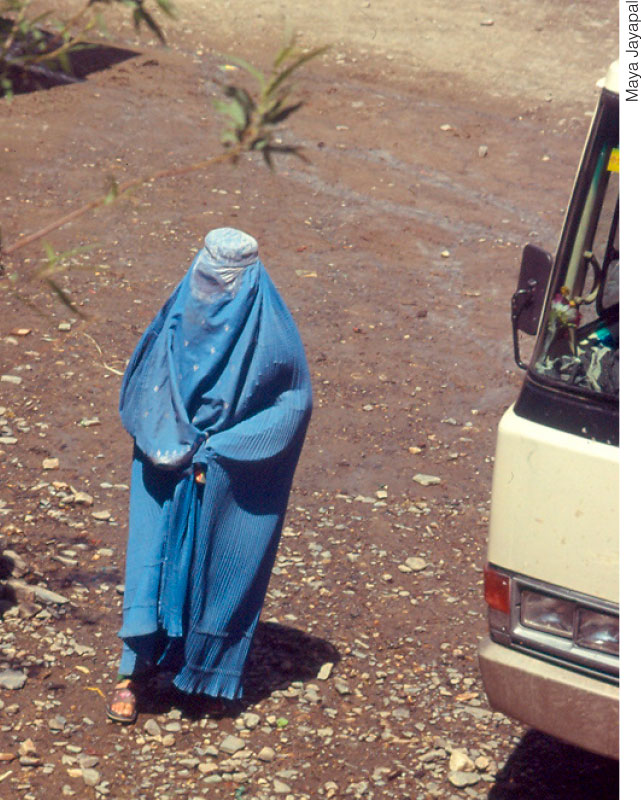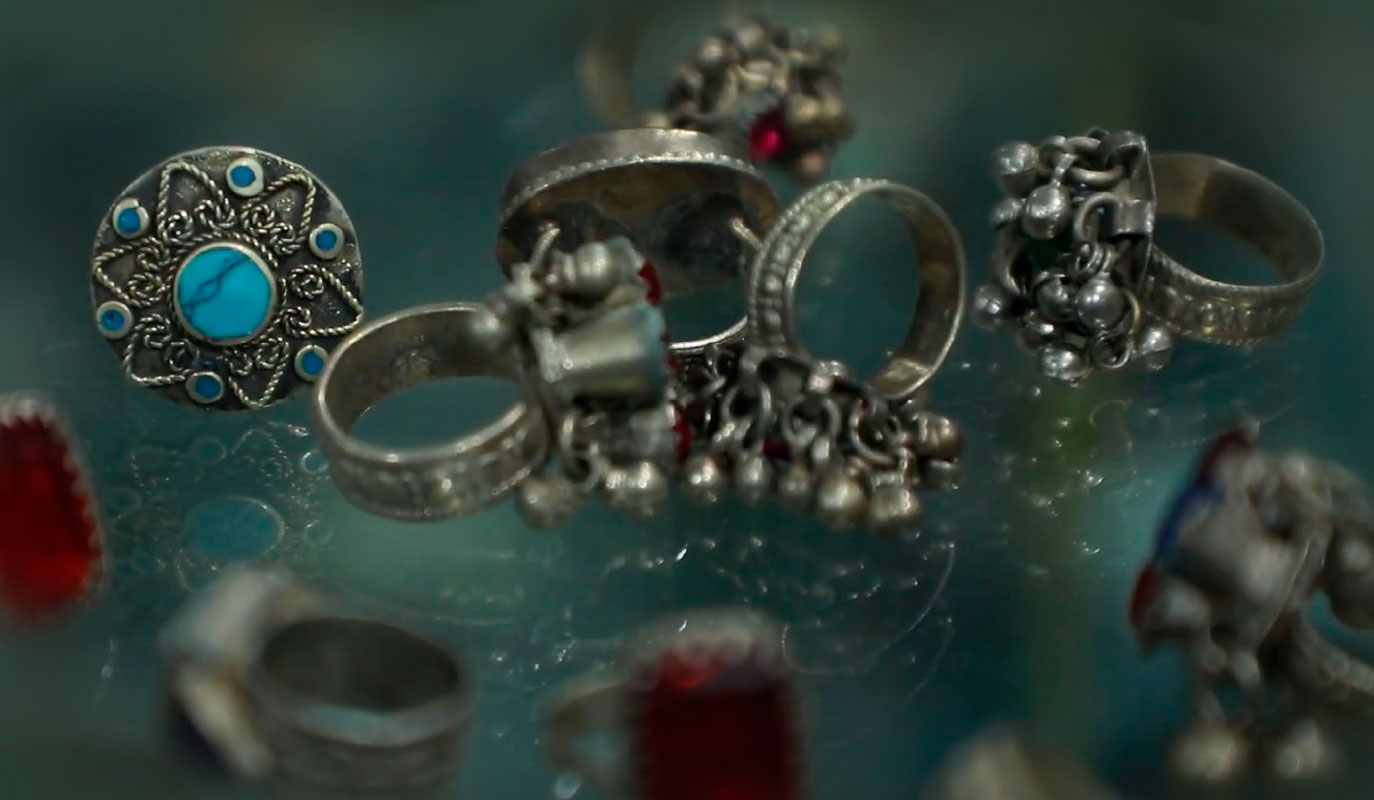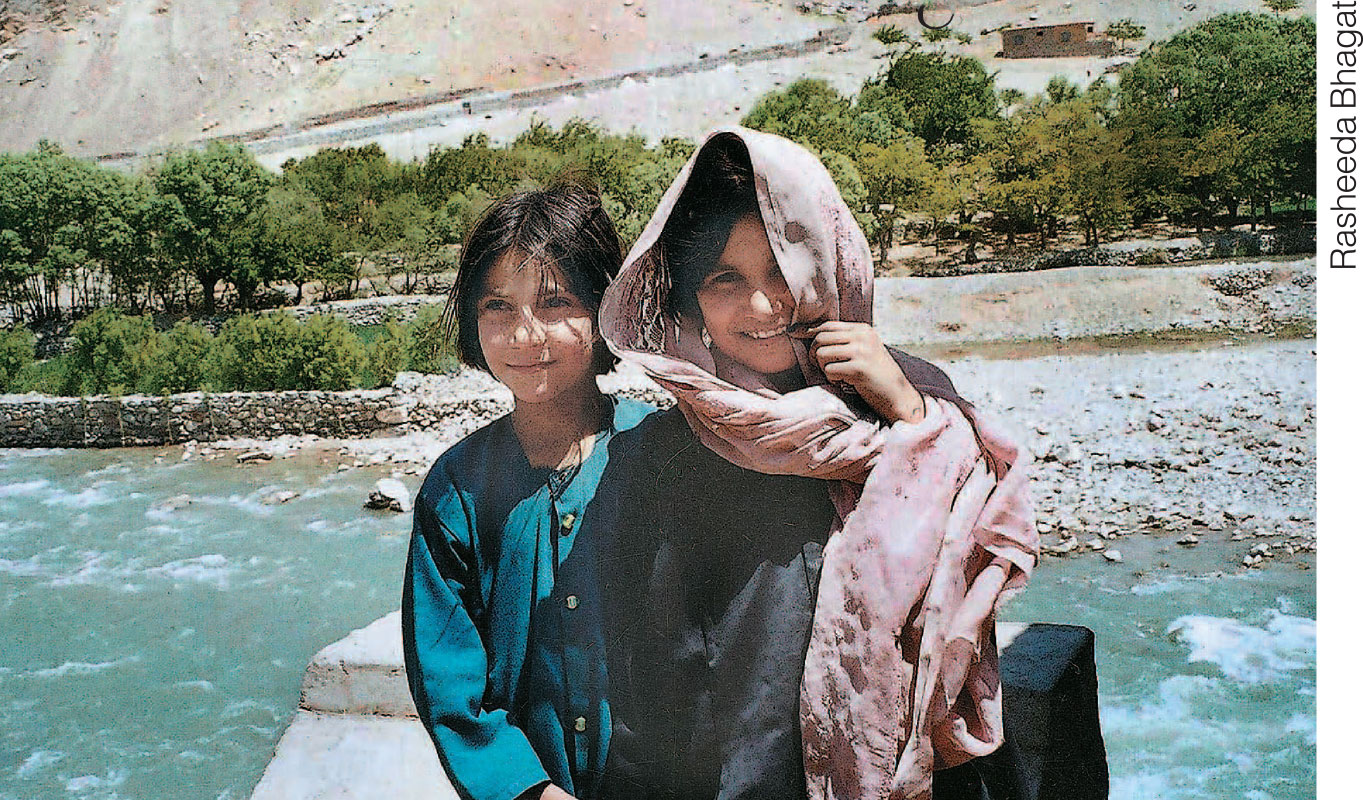Afghanistan: more questions than answers
In 2005, while working with the Hindu Business Line, I got an opportunity to visit and report from the war-ravaged Afghanistan. It had then been freed from the dark days of Taliban rule, its reconstruction was on, but the most heartbreaking part of the trip was watching the devastation of the entire country following decades of strife, violence, war and brutality. The women were of course the worst hit, and being most interested in gender issues, my first and foremost focus was in finding out, from the women themselves, all about the torture and brutality they had suffered during the Taliban years and earlier.
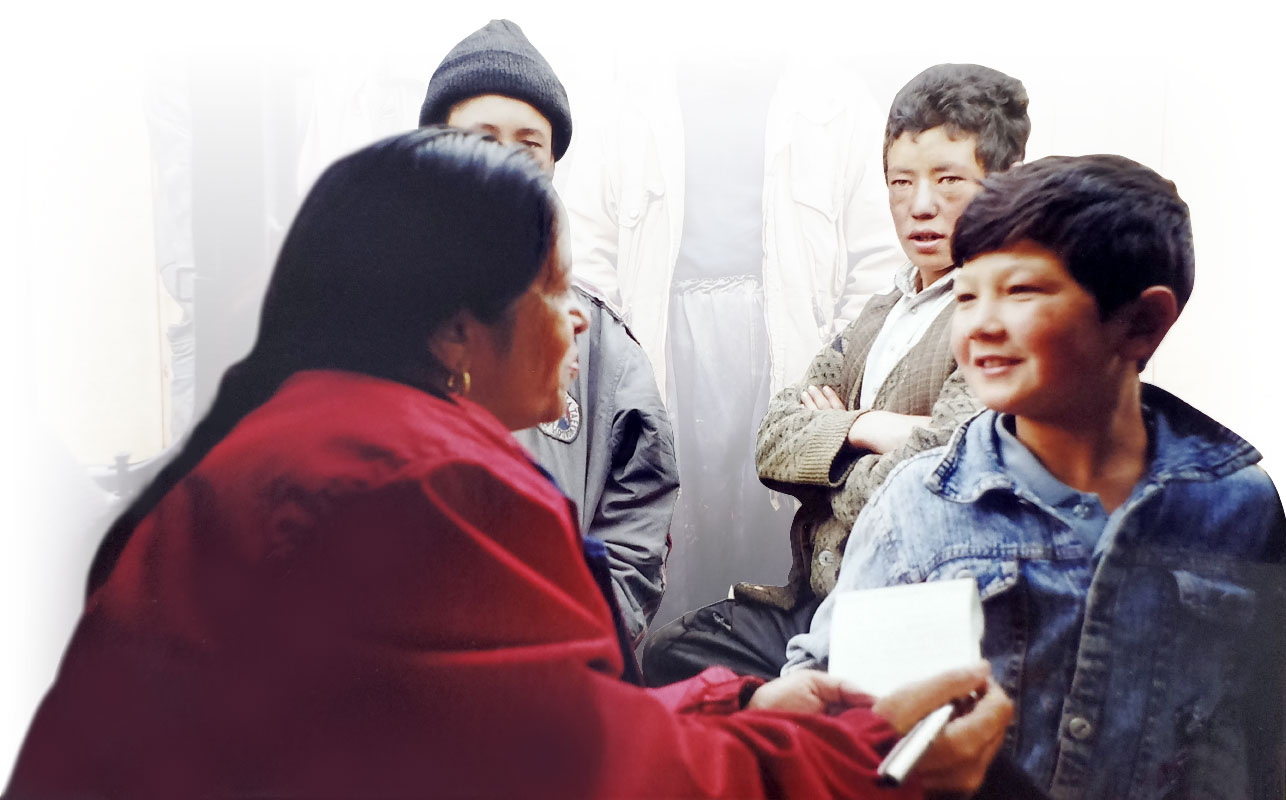
The trip happened following a casual chat with Uma and Karthik Narayanan, who had good friends in the French embassy in Kabul, who had promised to be our local guides. So Karthik and Uma, Narayanan, their friend from Bangalore Maya Jaypal, and I, set off on a flight from Delhi to Kabul. Our natural choice of hotel was the Intercontinental, which despite its terrifying history of being attacked and damaged in street warfare by different kinds of militias during the country’s civil war in the 1990s, sustaining periodic battering all the time, was the only option, being the only large decent hotel in Kabul with some assurance of security.
After 9/11, during the US invasion of Afghanistan, and its aftermath, it was here that the international media had mostly stayed. From the Kabul airport, as we drove to the hotel on roads which I then thought were broken and bruised — worse came later — it was impossible to miss the ubiquitous land cruisers, crisscrossing the roads. I later discovered that more than the Hamid Karzai government, international aid organisations, mainly those belonging to the United Nations, were running the country and these land cruisers belonged to the NGOs operating out of Afghanistan.
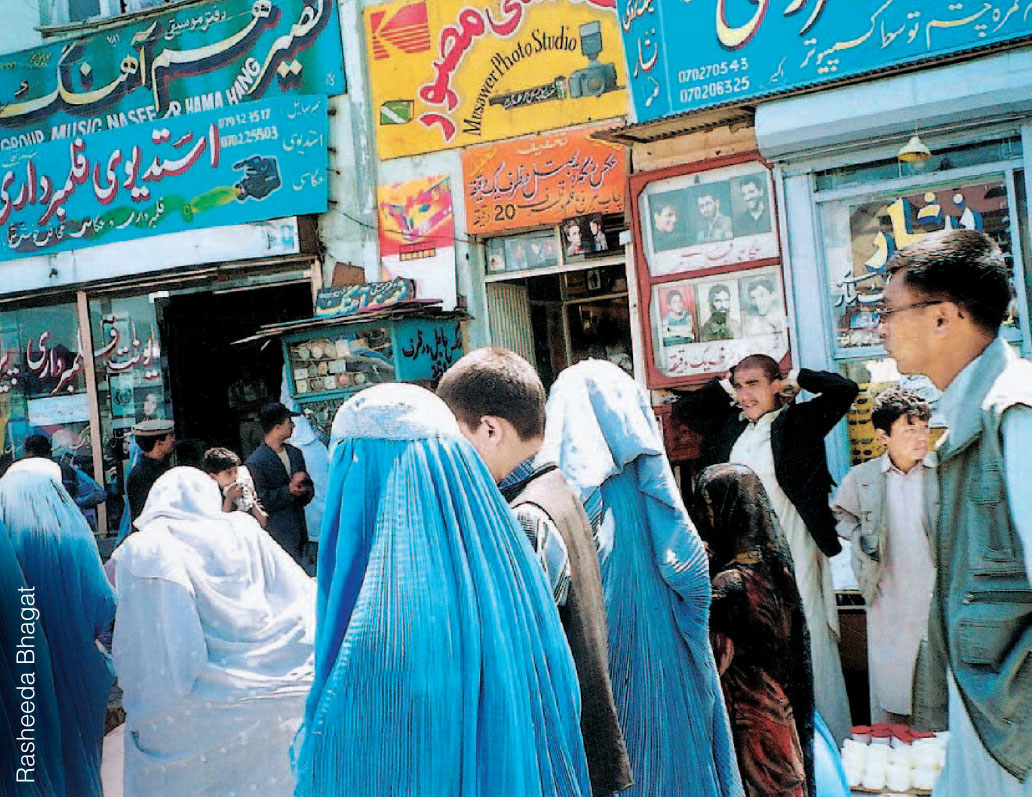
With no doubt in my mind that the status of women and girls’ education would form the backbone of the articles I file on Afghanistan, with great eagerness I accompanied my companions to Chicken Street, Kabul’s only famous and buzzing shopping street. With the fragrance of kebabs and other street foods wafting in the air, but alas for which we did not pause, as my friends were mostly vegetarian, the street was filled with shops overflowing with colourful ware such as different kinds of jewellery, leather goods, garments, knick-knacks, artwork, but above all, oriental, hand and machine-made carpets and rugs. Almost anything could be found carved from lapis lazuli, a semiprecious, deep blue gemstone native to Afghanistan… rings, ear rings, necklaces, bracelets, tableware, and so much more. We had been advised to carry US dollars in the denomination of 1, and these came mighty handy for the shopping, which opened up conversations.
The most heart-breaking part of the trip was watching the devastation of the entire country following decades of strife, violence, war and brutality.
Naturally this street was a magnet that drew scores of foreign visitors on the lookout for Afghan exotica, about which they had read or seen in movies. But providing a stark contrast to the vibrant colours, shine and shimmer of the goods on Chicken Street, were the shadows clad in light blue, that were gliding down the street, like walking bundles of life.
Most of Kabul’s women had, after long years of Taliban rule, gone behind the blue burkha, and were completely covered from head to toe. It broke my heart to reflect that once these women were so well-known for their sense of style and fashion, that Europe’s leading beauty care brands would launch their new product trials in Kabul along with ones in Paris, London and New York, to get a sense of its popularity with women. I tried following and addressing a couple of them, in a bid to make some conversation, but so scared were they of talking to a stranger, that the moment I tried to approach them, they quickened their pace and slithered away. Later I learnt they were still fearful of the Taliban.
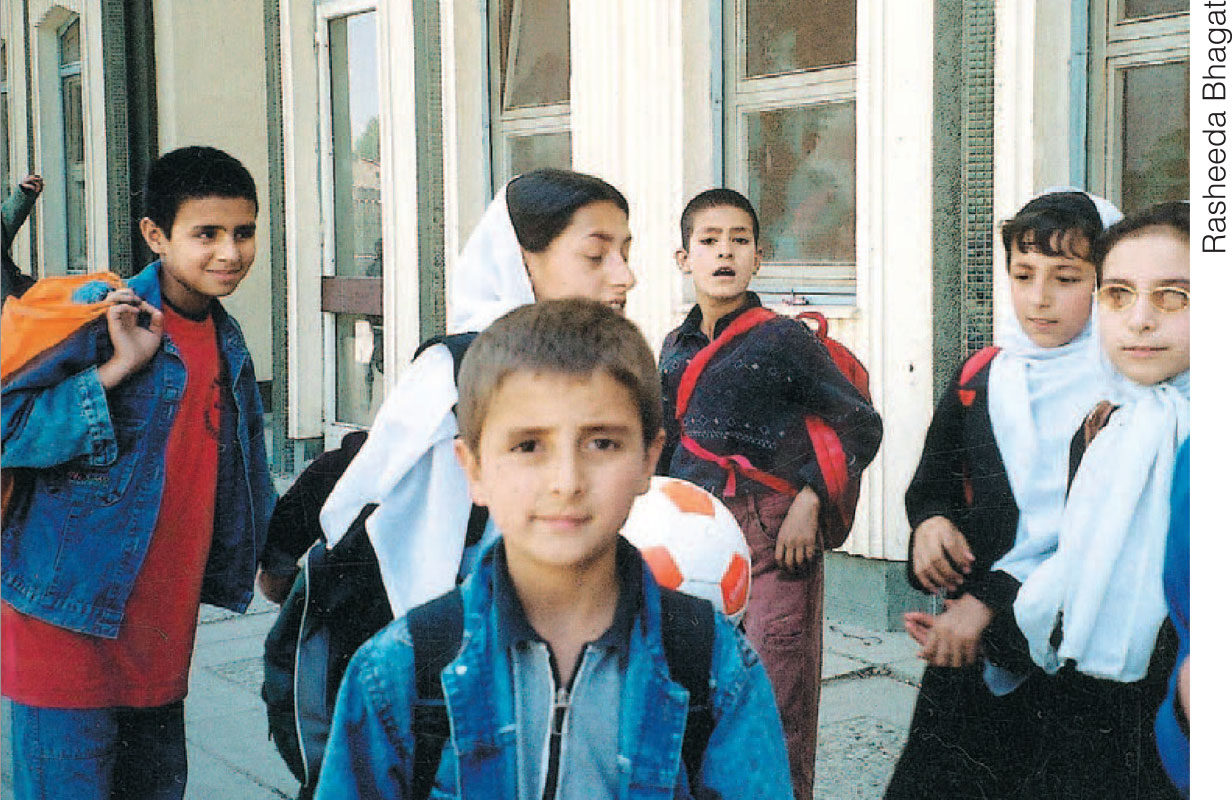
As we do our rounds around Kabul, trying to meet as many people from NGOs, embassies, schools, civil society and women activists, I am introduced to Nishaan (name changed) who is trying to revive the Baghe Zanana (garden for women). During the Shah’s days, the women of Kabul had an exclusive, fragrant and vibrant garden to themselves named thus, where they could meet and relax. But after the Russian invasion, and particularly during the Taliban’s rule since 1995, as women were banished to their homes, the garden had fallen desolate and became a weed and insects-infested barren land. Thanks to the efforts of an NGO, this was now being renovated, and luckily for me, had been thrown open to the women of the city barely a few months earlier. But the women came here only on Fridays in the afternoon.
As Friday was only a day away, I promptly went to the Baghe Zanana the next day, and could hardly believe my eyes. Here were at least a couple of hundred women, adolescent and younger girls; all of them had thrown away their burkhas, and there was stunning beauty, laughter and chatter on display. The women were seated in big circles, chatting with friends and enjoying a picnic lunch pulled out of baskets, as their children played in the park.
The women were seated in big circles, chatting with friends and enjoying a picnic lunch pulled out of baskets, as their children played in the park.
Every Friday a few hundred women and children assembled here to let down their hair, and remind themselves that it had been over three years since their worst tormentors, the Taliban, had gone. The Taliban, in the name of religion, had devastated the lives of tens of thousands of women, deprived them of human dignity, forced them to don the burkha (known as chadri in Afghanistan), quit their jobs and took their daughters out of schools and colleges. It was haram (forbidden) for a woman to step out of her house without being accompanied by a man, and women could not take any birth control measures.
All this was history now. Many educated and qualified women, who had braved nearly 15 years of conflict and violence under Soviet occupation and the mujahideen regime, considered the Taliban’s obnoxious laws against women to be the last straw on the camel’s back, and had fled the country during the six-year Taliban rule, beginning 1995.
A very excited Nishaan told me that only a couple of months earlier, “we had special visitors at the Baghe Zanana — three Afghan women doctors who had been living and working in Germany for almost a decade.” They had come to their home country to check out for themselves the situation on the ground. Prior to the visit to the garden, the doctors had taken a tour of Kabul’s dilapidated and ill-equipped hospitals, struggling to offer even minimal healthcare to the sick. They saw the pathetic state of the buildings, the inadequate infrastructure, outdated medical equipment and inadequate medicines, and above all, doctors from foreign countries, including Indian doctors, working against all the odds to save lives.
“When they saw so many women assembled in the women’s garden — women and children chattering, laughing, eating and even singing — they made an important decision. They took out their German passports and tore them to bits, saying we are not going to leave Afghanistan. It needs us.”
I don’t understand why the international community did not take care of Afghanistan much earlier. Why did we wait till the Taliban took over?
– Jean Mazurelle, World Bank chief in Afghanistan
With Afghanistan soon descending into chaos and violence again with the Taliban regrouping and resurfacing soon after my visit, and continuing to do so since then, I have often wondered if those brave women doctors regretted their decision. Anyway, even then, there were plenty of challenges facing the country.
Afghanistan is still “unstable”, said Carol Martin, programme director of the Swedish Committee for Afghanistan (SCA), which was established in 1980 as a humanitarian solidarity agency to support the Afghan people against Soviet occupation. It was the biggest international aid organisation working in Afghanistan’s 21 provinces, with an annual budget of $22 million. She said there had been times in the last 20 years, “when the SCA has virtually taken over the role of the government in administering the country.”
She added that the reconstruction of Afghanistan would “take a long, long time, because this is a totally devastated country and there is no real law-making government here. This is what frustrates the Afghan people.”
The World Bank’s country chief in Afghanistan then, Jean Mazurelle, was more forthright about the fragile peace holding in Afghanistan. But first an amusing story he related to us. Of course, all foreigners in Afghanistan were on high alert, as risk of kidnapping was rampant. Once, a couple of World Bank’s men were waylaid near their living quarters, and asked at gunpoint to “part with videos of porn! The Pashtuns waving a gun at their face said since they were “westerners, surely they watched porn movies all the time! My men had a hard time convincing them that they honestly did not have any porn videos,” he chuckled.
But, on a serious note, Mazurelle, who had been posted in Afghanistan for a year, felt that unless the Afghan government and the international community speeded up reconstruction efforts and make the change ‘visible’, the people’s patience would run out. He was incredulous and failed to “understand why the international community did not take care of this country much earlier. Why did we wait till the situation came to the point of the Taliban and the Soviet occupation before that? I can understand the resentment of the Afghans that they had to wait till 9/11 before the international community took notice of Afghanistan. An Afghan told me that 9/11 was a lottery ticket for them, and they would not give away this lottery ticket. I felt very sad to hear this but can understand their resentment against the entire world and why they want to be compensated.”
For me, the 10-day visit to Afghanistan was as heartbreaking as educative. I learnt that over the past 25 years, educated Afghans had fled the country, and three years after the ouster of the Taliban regime, a small segment of them, such as the Afghan-German doctors mentioned above, had begun to return. But they had to accept the reality of earning a fraction of the money they used to make in Europe.
Majid Nabizada was one of them. He had returned from France, where he earned 2,200 euro a month, to work at the Lycee Esteqlal High School in the heart of Kabul. This was battered by decades of war but had now been rebuilt and was being run by the French. His present salary was a meagre $60, and to pay his monthly rent of $250, along with a year’s rent in advance, he had to fall back upon his savings from his 22-year stay in France. But other local teachers I met at that school, did not have this luxury. I met one teacher who had to double up as a taxi driver to make both rent and food.
When this was the plight of the teachers, one felt like crying to even think about the wasted years for the students. Especially, the girls who were forced by the Taliban to quit study altogether.
Most of the country’s schools were destroyed by long years of violence and in interior Afghanistan classes were being held in dilapidated buildings without doors and windows, and sometimes not even a roof. What this would mean in a country with extreme winters and summers could be imagined. During its six-year rule, the Taliban had banned girls’ education and closed all girls’ schools.
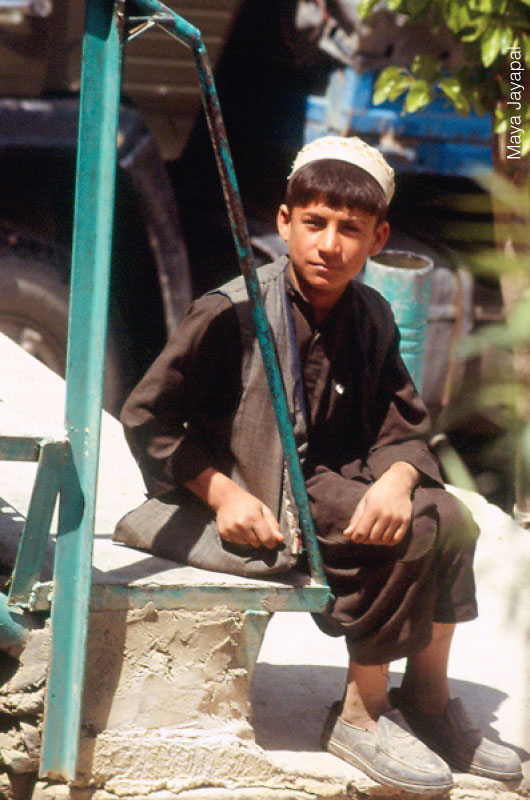
Director of the high school we visited, Wali Mohammed, explained how the “Taliban destroyed our education system, forcing qualified teachers to flee the country.” It warmed your heart to see neatly dressed, bright-eyed young girls in the school library. But in this Islamic country co-education was rare and girls would have to leave this school, where 5,000 children received free education, after Class 3 to go to an exclusive girls’ school.
He added that while the younger girls had returned to school, those in their teens were reluctant to come back because they would now have classmates at least six years younger. I left the school wondering what the Afghan administration would do to get these young women back into mainstream education. Would any special classes be held for them?
There were more questions than answers in Afghanistan then.
(To be continued)

